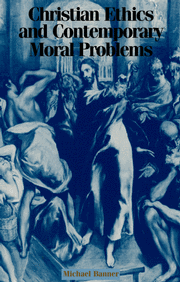Book contents
- Frontmatter
- Contents
- Preface
- Acknowledgements
- 1 Turning the world upside down – and some other tasks for dogmatic Christian ethics
- 2 Christian anthropology at the beginning and end of life
- 3 The practice of abortion: a critique
- 4 Economic devices and ethical pitfalls: quality of life, the distribution of resources and the needs of the elderly
- 5 Why and how (not) to value the environment
- 6 On not begging the questions about biotechnology
- 7 ‘Who are my mother and my brothers?’: Marx, Bonhoeffer and Benedict and the redemption of the family
- 8 Five churches in search of sexual ethics
- 9 Prolegomena to a dogmatic sexual ethic
- Bibliography
- Index
9 - Prolegomena to a dogmatic sexual ethic
Published online by Cambridge University Press: 21 May 2010
- Frontmatter
- Contents
- Preface
- Acknowledgements
- 1 Turning the world upside down – and some other tasks for dogmatic Christian ethics
- 2 Christian anthropology at the beginning and end of life
- 3 The practice of abortion: a critique
- 4 Economic devices and ethical pitfalls: quality of life, the distribution of resources and the needs of the elderly
- 5 Why and how (not) to value the environment
- 6 On not begging the questions about biotechnology
- 7 ‘Who are my mother and my brothers?’: Marx, Bonhoeffer and Benedict and the redemption of the family
- 8 Five churches in search of sexual ethics
- 9 Prolegomena to a dogmatic sexual ethic
- Bibliography
- Index
Summary
Christian ethics is Christian ethics in so far as it is dogmatic – that is, in so far as it allows its form and content to be shaped by, and tested against, the affirmations of Christian doctrine. More fully we may maintain that Christian ethics is founded upon and arises from the threefold knowledge of God and humankind as creator and creature, reconciler and sinner, redeemer and heir of God's good future, given in the life, death and resurrection of Jesus Christ. Thus it is the task of Christian ethics to understand the claiming of humankind which is implicit within its gracious election as a threefold imperative; specifically Christian ethics may speak of the Gospel of Christ as containing within itself the threefold command of God the creator, the reconciler and the redeemer. As the command of the creator, the command of God commands us to be what we are. As the command of the reconciler, the command of God is directed against the disorder of our present existence. As the command of the redeemer, the command of God directs us to the good future which God intends, and thus to what we shall be.
Christian sexual ethics, to turn to the subject of this chapter, will properly be developed on the basis of this self-understanding, learning, that is to say, to understand and represent life in this sphere as determined by knowledge of the claim made upon us by the grace of God shown in Jesus Christ. It will thus expound three principal theses, displaying Christian sexual ethics as the command of the creator addressed to the creature, as the command of the reconciler addressed to the sinner, and as the command of the redeemer addressed to the heir of God's good future.
- Type
- Chapter
- Information
- Christian Ethics and Contemporary Moral Problems , pp. 269 - 309Publisher: Cambridge University PressPrint publication year: 1999



